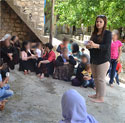 |
 |
 |
Project - Yazda |
 |
|
Yazda - Education in Sinjar
yazda.org
The 3 month school session is completed. Read the results report on how the children fared.
 On 3 August 2014, ISIL militants attacked and took over Sinjar in northern Iraq, which at the time was predominantly inhabited by Yazidis and was a Kurdish-controlled town (now it and the surronding areas are controlled by the Iraqi Army).
On 3 August 2014, ISIL militants attacked and took over Sinjar in northern Iraq, which at the time was predominantly inhabited by Yazidis and was a Kurdish-controlled town (now it and the surronding areas are controlled by the Iraqi Army).
Yazidis, have reported summary executions that day by militants, leading to 200,000 civilians fleeing Sinjar, of whom around 50,000 Yazidis were reportedly escaping to the nearby Sinjar Mountains. They were trapped on Mount Sinjar, surrounded by militants and faced starvation and dehydration.
 With the defeat of ISIS in North Iraq and Syria, many children could not continue their education. Some have returned Sinjar. The social fabric of the community and children specially was destroyed by the genocide and needs rebuilding. In this context, Yazda has seized the opportunity to promote education for children and the youth, enhance their capacity to re-enroll in the regular school after three years of the crisis.
With the defeat of ISIS in North Iraq and Syria, many children could not continue their education. Some have returned Sinjar. The social fabric of the community and children specially was destroyed by the genocide and needs rebuilding. In this context, Yazda has seized the opportunity to promote education for children and the youth, enhance their capacity to re-enroll in the regular school after three years of the crisis.
Education has not reached many children in the last 3 years of displacement, and literacy courses are much needed for the age group 15 and above, who attended school in the best of cases only up to 12 years old. Youth have often left the school and became victims of militias or hard labor supporting family, especially as the male population was the target of the genocide. Education will increase the opportunity for the youth to work independently and will help the children to learn english and basics of science.
 Yazda will fund 3 months of school for approximately 300 children in the area targeting the age groups of 6 to 15 years old, involving 300 from North part of Sinjar Mountains: Sunni Municipality(75 to 100 children in Khanesor, 120-150 children in Dogure, and 120-130 in Duhola).
Yazda will fund 3 months of school for approximately 300 children in the area targeting the age groups of 6 to 15 years old, involving 300 from North part of Sinjar Mountains: Sunni Municipality(75 to 100 children in Khanesor, 120-150 children in Dogure, and 120-130 in Duhola).
While this grant can only help with a portion of the school year by having children enrolled and involved in school on a regular basis they hope to expand the education system in the area as a requirement, not a luxury.
|
|
|